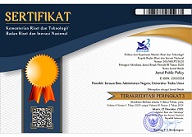Transfer of Land and Building Taxes in the Plantation and Forestry Sector in Indonesia in a SWOT Analysis Review
Abstract
Indonesia is a country that has high natural resource potential. This potential encourages the government to collect the tax on land and building plantations, forestry, mining, and other sectors (PBB-P3). Then the proceeds are allocated to local governments to overcome vertical fiscal inequality. However, in practice, problems were found related to the low fiscal independence of regions due to dependence on Transfers to Regions (TKD) by the central government and the distribution of Revenue Sharing Funds (DBH) on Land and Building Taxes and natural resources. This paper analyzes the strengths, weaknesses, opportunities, and threats of Land and Building Tax (PBB) in the Plantation and Forestry sector devolution from the central tax to local taxes. Also, analyze the strategies for the transfer of PBB plantation and forestry sector. This study uses a qualitative approach with SWOT analysis and primary collection techniques through in-depth interview data and literature study. The analysis results show that PBB plantation and forestry sector has several weaknesses and threats related to the readiness of local government human resources, the mechanism for collecting PBB-P3, and the impact on the exploitation of natural resources. However, the strengths and opportunities found in this study can be considered for the regionalization of PBB plantation and forestry sector in the future. Strength-opportunity, strength-threat, weakness-opportunity, and weakness-threat strategies that can be prepared are preparing local government human resources, technological facilities for PBB-P3 administration, and special rules governing PBB-P3 regionalization.
Keywords
Full Text:
PDFReferences
Ahmad, E. & Mansoor, A. (2002). Indonesia: Managing Decentralization. International Monetary Fund, IMF Working Paper, WP/02/136.
Allain-Dupré, D., Chatry, I. & Phung, L. (2021). Subnational capacity building: An international perspective of the Asia Pacific region, in Kim, J. and S. Dougherty (eds.). Local Public Finance and Capacity Building in Asia: Issues and Challenges, OECD Publishing, Paris. https://doi.org/10.1787/4fe4a6d3-en.
Aritenang, A. F. (2020). The effect of intergovernmental transfers on infrastructure spending in Indonesia. Journal of the Asia Pacific Economy, 25:3, 571-590, DOI: 10.1080/13547860.2019.1675352.
Asher, M. G. (2002) The Role of Property Tax in Fiscal Decentralization in Indonesia. Policy and Society, 21:2, 26-41, DOI: 10.1016/S1449-4035(02)70007-6.
Babbie, E. (2004). The Practice of Social Research: 10th Edition. Belmont: Wadsworth/Thomson Learning.
Badan Pusat Statistik. (2021). Statistik Indonesia 2021.
Basrowi dan Suwandi. (2008). Memahami Penelitian Kualitatif. Jakarta: Rineka Cipta.
Bird, R. M. & Vaillancourt, F. (1998). Fiscal decentralization in developing Countries: an overview. New York: Cambridge University Press. Chapter 01.
Bisnis.com. (2013). Pungutan Kehutanan 20%-30%, Ini Keberatan Pengusaha Hutan. 18 September 2013 (diakses pada 16 Juni 2022) https://ekonomi.bisnis.com/read/20130918/99/163768/pungutan-kehutanan-20-30-ini-keberatan-pengusaha-hutan
Bisnis.com. (2021). Fiskal Daerah Tak Kunjung Mandiri, KPPOD Harap UU HKPD Jadi Solusi. 23 Desember 2021 (diakses pada 16 Juni 2022) https://ekonomi.bisnis.com/read/20211223/10/1481038/fiskal-daerah-tak-kunjung-mandiri-kppod-harap-uu-hkpd-jadi-solusi
Brockington, D. (2008). Corruption, Taxation and Natural Resource Management in Tanzania. The Journal of Development Studies, 44:1, 103-126, DOI: 10.1080/00220380701722332.
Creswell, J. W. (2013). Qualitative inquiry and research design: Choosing among five approaches. Sage publications.
Escaleras, M. & Calcagno, P.T. (2018). Does Fiscal Decentralization Affect Infrastructure Quality? An Examination of U.S. States. Contemporary Economic Policy, 36:410-422. https://doi.org/10.1111/coep.12258.
Goerl, C. A. & Seiferling, M. (2014). Income Inequality, Fiscal Decentralization and Transfer Dependency. International Monetary Fund, IMF Working Paper, WP/14/64.
Hamid, E. S. (2005). Formulasi Alternatif Dana Alokasi Umum (DAU): Upaya Mengatasi Ketimpangan Fiskal dalam Era Otonomi Daerah. Yogyakarta: UII Press.
Harefa, M., Permana, S. P., Mangeswuri, D. R., Meilani, H. (2017). Optimalisasi Kebijakan Penerimaan Daerah. Jakarta: Yayasan Pustaka Obor Indonesia.
Katadata. (2021). Pajak Sawit Belum Optimal. 16 Februari 2022 https://katadata.co.id/jeany/infografik/602c8f5a54fb0/pajak-sawit-belum-optimal
Ministry of Energy and Mineral Resources (2017). Pentingnya Transparansi Dana Bagi Hasil (DBH) Untuk Daerah. (diakses pada 16 Juni 2022) https://eiti.esdm.go.id/pentingnya-transparansi-dana-bagi-hasil-dbh-untuk-daerah/
Kementerian Keuangan Republik Indonesia. (2020). APBN Kita, Kinerja dan Fakta: Kaleidoskop 2019 (Edisi Januari 2020).
Kementerian Keuangan, Direktorat Penyusunan APBN dan Direktorat Jenderal Anggaran. (2021). Informasi APBN 2021 Percepatan Pemulihan Ekonomi dan Penguatan Reformasi. (diakses pada 3 Juni 2022) https://www.kemenkeu.go.id/media/16835/informasi-apbn-2021.pdf
Kontan.co.id. Menkeu: Ketergantungan APBD pada dana transfer daerah sangat tinggi. 10 Desember 2018 (diakses pada 17 Maret 2022) https://nasional.kontan.co.id/news/menkeu-ketergantungan-apbd-pada-dana-transfer-daerah-sangat-tinggi
Kristiaji, B. B., Vissaro, D. & Ayumi, L. (2021). Mempertimbangkan Reformasi Pajak Daerah berdasarkan Analisis Subnational Tax Effort. DDTC Working Paper 2421.
Kuncoro, M. (2004). Otonomi dan Pembangunan Daerah Reformasi Perencanaan Strategis dan Peluang. Jakarta: Penerbit Erlangga.
Neuman, W. L. (2014). Social Research Methods, Qualitative and Quantitative Approaches: Seventh Edition. USA: Pearson.
Prasetyo, B., & Jannah, L. (2007). Metode Penelitian Kuantitatif: Teori dan Aplikasi. Jakarta: PT. Raja Grafindo Persada.
Pusat Kajian Anggaran Badan Keahlian Dewan Perwakilan Rakyat Indonesia. (2020). Mendorong Kemandirian Fiskal Daerah Melalui Pembiayaan Kreatif. Analisis RUU Tentang APBN, No. 12/an.PKA/APBN/IX/2020.
Rangkuti, F. (2001). Analisis SWOT Teknik Membedah Kasus Bisnis. Jakarta: Gramedia Pustaka Utama.
Ross, M. L. (2013) The Political Economy of Petroleum Wealth. Middle East Development Journal, 5:2, 1350009-1-1350009-19. DOI: 10.1142/S1793812013500090.
Smoke, P. & Kim, Y. H. (2002). Intergovernmental Fiscal Transfers in Asia, Current Practice and Challenges for the Future. Manila: Asian Development Bank.
Sudhipongpracha, T. & Wongpredee, A. (2016). Fiscal Decentralization in Comparative Perspective: Analysis of the Intergovernmental Grant Systems in Indonesia and Thailand. Journal of Comparative Policy Analysis: Research and Practice, DOI:10.1080/13876988.2016.1138659.
Suyanto. (2017). Kajian Ketimpangan Fiskal (Fiscal Imbalance) Dan Kebijakan Desentralisasi Fiskal Pada Daerah Otonom. Prodi Ekonomi Pembangunan Universitas dr. Soetomo, 1(1), https://doi.org/10.25139/dev.v1i1.70.
DOI: https://doi.org/10.35308/jpp.v8i3.5484
Refbacks
- There are currently no refbacks.
Copyright (c) 2022 Nastiti Tri Sandy, Inayati
p-ISSN: 2477-5738 I e-ISSN: 2502-0528 I DOI: 10.35308
Jl. Alue Peunyareng, Ujong Tanoh Darat, Meureubo, Kabupaten Aceh Barat, Aceh 23681, Indonesia
(0655) 7110535 l +621260313742 l +6285277110911
 is licensed under a Creative Commons Attribution-ShareAlike 4.0 International License
is licensed under a Creative Commons Attribution-ShareAlike 4.0 International License


